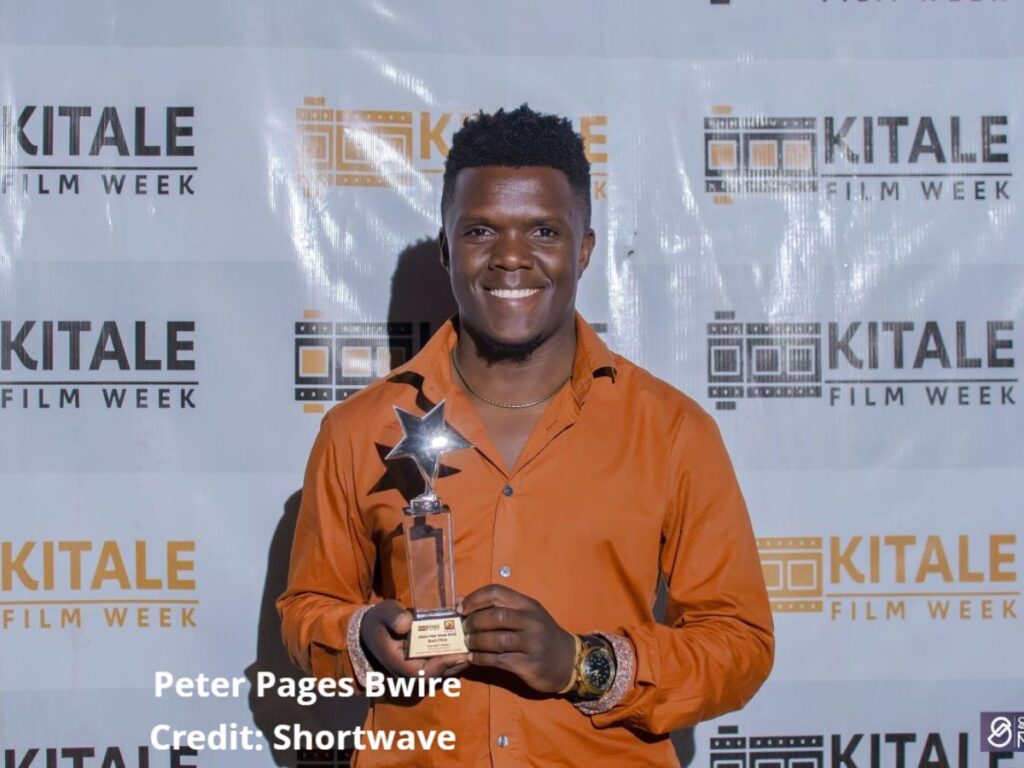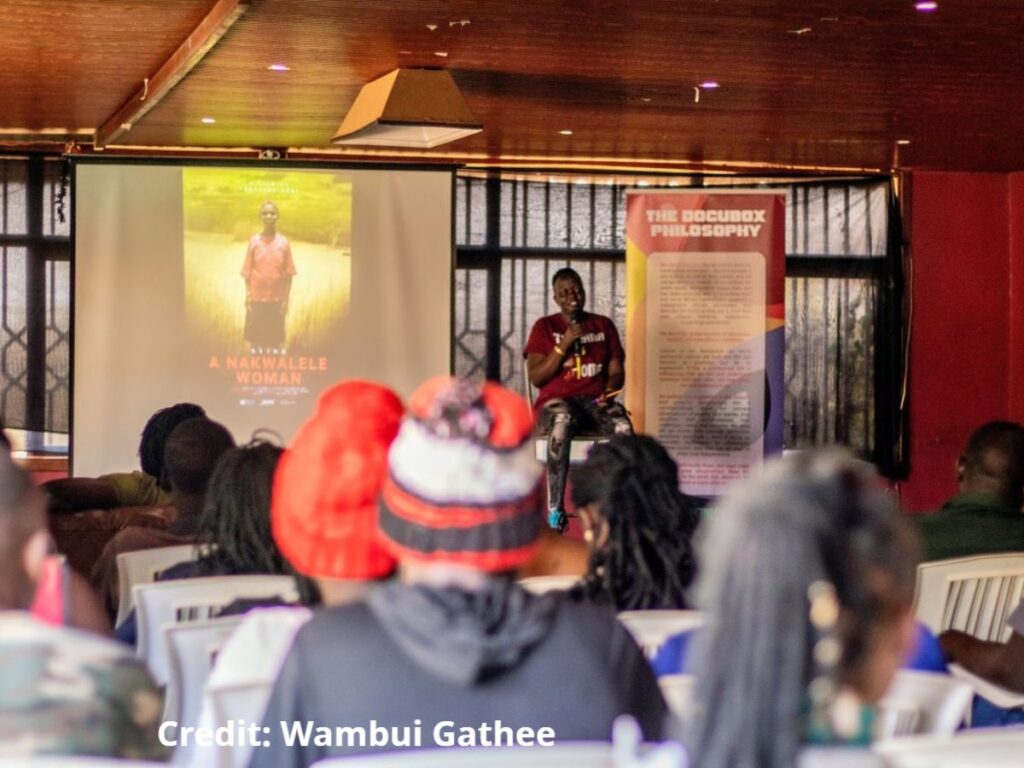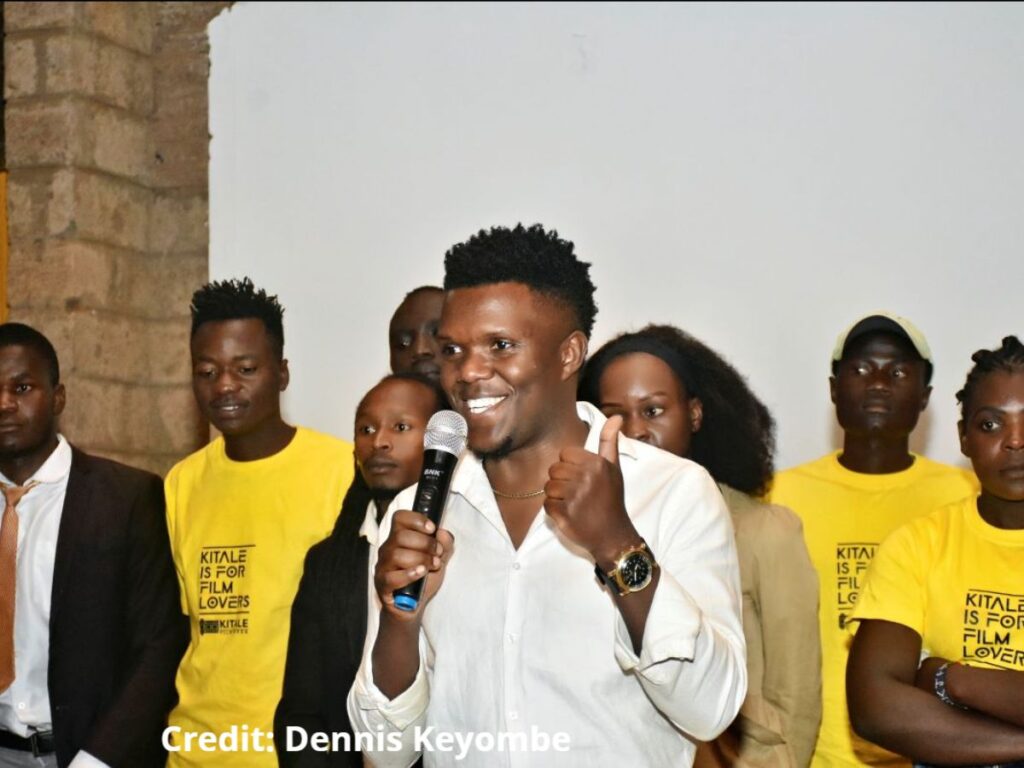Kitale Film Week, entering its third year in 2025, is not just a film festival—it’s the foundation for a transformative vision to turn Kitale, the Western Kenyan town, into a creative hub for African storytelling. Founded in 2023 by Peter Pages Bwire, the initiative celebrates underrepresented voices, nurtures local talent, and promotes a new culture of cinema in a region that has no cinematic infrastructure.
“When we started, the only screens were in bars showing football matches,” Bwire explains during a comprehensive conversation with Akoroko. There are still no movie theaters in Kitale. “But we knew people would come if we brought films to them. That’s why we transformed schools, community halls, and even outdoor spaces into cinemas.”
This creative problem-solving launched a festival that has grown in scope, ambition, and impact over its three editions, within a community that offers a more tranquil, rural experience, versus Nairobi, the capital and largest city of Kenya, which serves as the political, economic, and cultural hub.
“Our vision has always been to turn Kitale into a creative city,” Bwire says, pointing to long-term goals like establishing cinemas, film schools, and production hubs. “We’re not just running a festival. We’re trying to create a place where stories can be made and celebrated year-round.”
From February 2 to 9, 2025, this growing cinematic celebration—evolving from a focused showcase of Kenyan and Ugandan films into a broader platform for African filmmaking—will bring over 50 films from 20 countries to a town determined to reimagine its relationship with cinema.
From Writer to Film Distributor
Before founding Kitale Film Week, Bwire started with different aspirations. “I wanted to be a writer when I was younger,” he recalls. “I wanted to write stories, fiction stories, short stories, novels. Then I wanted to be a journalist.” But when it came time for university, government sponsorship limitations meant journalism was out of reach.

The film and theater program at Kenyatta University caught his attention—it was relatively new, just three or four years old at the time, and offered the added benefit of studying in Nairobi, where he wanted to be.
At university, Bwire fell in love with theater immediately, acting in stage productions. “I did production design for one year when I was in my fourth year,” he says. In his final year before graduating, an unexpected opportunity arose: a paid marketing internship. Though hesitant initially, he accepted the position and found himself drawn to the business side of creative industries.
This new direction, combined with his film background, led him to organize a Christian film festival in Nairobi in 2016. The success of this event led to a series of smaller screening initiatives around the city. His work caught the attention of the Mandela Washington Fellowship, a U.S. State Department program focused on community engagement and civic leadership. This opportunity, followed by studies in the business of film in England, solidified his focus on distribution and development.
Building from the Ground Up
Kitale’s film community, though passionate, operates largely through informal structures. “When I came back from England,” Bwire explains, “I found two or three groups where about 30 people come together, contributing maybe 50 shillings each to make films. They don’t know much about how the industry works – they just pool money, make one film, then go back to contribute again for another one.”
This reality shaped the cultural gathering’s approach to community development. Initially, Bwire and his team had grand ambitions of collecting films from across the continent, even reaching out to contacts in DR Congo and the Caribbean islands.
However, they ultimately decided to start closer to home, focusing the 2023 debut on films from Kenya and neighboring Uganda—a natural choice given Kitale’s proximity to the Ugandan border and strong business ties between the regions.
The team sought guidance from industry veterans across Africa, including Mudamba Mudamba of DocuBox, South African film journalist Lara Utian-Preston, and established festival organizers. Now, for its third edition, the festival has expanded to its original pan-African vision.
Evolution and Adaptation
The program’s structure has evolved dramatically based on community response. “Early editions included special events built around specific themes, aiming to position film as a factor in sustainable development. “We would look at the national agenda and local government agenda, what they are trying to do,” Bwire explains. “If they want to improve agriculture, let’s find some films about agriculture, put them in our festival program.”
These sessions, which invited government officials and community members, consistently filled venues of 300-person capacity. “But the problem is that they always came to talk, never talked about the film, just talked about the topic and left.”
This observation led to a strategic shift for the 2025 edition. The organizing team eliminated special events and masterclasses, focusing instead on film-centered discussions with creators. The change wasn’t just about program focus—it was about effectiveness. Similarly, while they offered filmmaking masterclasses initially, low community engagement prompted a rethink. “We could not see the community building, pushing themselves to be part of those masterclasses or learning something new,” Bwire notes.

The challenge runs deeper than just workshop attendance. The local films, while enthusiastically made, “would not be selected by any festival in the world,” Bwire explains, referencing the lack of technical and professional standards required for broader exhibition. “Some of them think they are the best at what they are doing… so when we try to bring workshops, some of them don’t show up.”
Despite these challenges, the program has found its rhythm. Screening times moved from early morning starts to a 1 pm to 10 pm schedule, better accommodating audience availability. The program now unfolds over multiple venues, including the Kitale Museum Auditorium and Deep Sea Resort, plus outdoor screenings bringing films directly to neighborhoods like Lessos Center, Matisi, and Kisumu Ndogo.
A Growing Platform
The 2025 lineup is a reflection of both artistic ambition and strategic programming. The opening night film is “Nawi,” Kenya’s submission for the 97th Academy Awards, which addresses child marriage and education for girls.
The broader selection includes contemporary features like “Mission Xylara,” a Ugandan sci-fi thriller, alongside restored classics such as Ousmane Sembène’s landmark “Mandabi” (1968), widely recognized as the first feature film made in an African language, specifically Wolof.
Documentary selections tackle pressing issues like climate change in films like “The Sorghum Sisters,” following Turkana women adapting farming practices, and “Our Land, Our Freedom,” exploring Kenya’s colonial legacy.
Generally, programming decisions balance artistic merit with audience development. The selection process considers both critical and strategic factors designed to build sustainable audiences while maintaining curatorial standards.
This year’s edition maintains a strong focus on emerging talent, particularly with its short film program platforming new voices from across the continent.
Sustainable Operations
The cinematic showcase operates using a complex network of support. While Bwire serves as founder and principal director, he intentionally stays somewhat behind the scenes, encouraging local talent to become the event’s public face. A diverse team handles different aspects: dedicated managers for each venue, hospitality coordinators for visiting filmmakers, marketing specialists, and volunteers who serve as MCs and technical support.
Financial sustainability comes from multiple channels. The French Embassy in Kenya has been a key supporter for the past two editions and has promised continued support, notably without demanding French films or French-language content in return.
Additional backing comes from the Dutch Embassy and local government (which contributed 200,000 Kenyan Shillings—about $1500—to previous editions). However, much of the operation relies on in-kind support: community organizations provide venues free of charge, local companies loan sound equipment and projectors, and volunteers contribute time and expertise.

Bwire himself maintains this sustainable approach in his professional life. He writes grants and strategic plans for organizations around Kitale, currently managing different entities including a community college and a women’s empowerment organization he helped establish in 2012.
This diversified portfolio proves crucial for the festival—his work with a sound and event company, for instance, provides access to essential equipment like speakers and lights. “All these organizations that I have to run, they have something that I can use during the festival,” he explains.
Industry Context and Future Vision
As Kitale Film Week prepares for its third edition, Bwire reflects on the broader evolution he’s witnessed in Kenya’s film sector. Against the backdrop of rapid technological change and growing creative confidence, he sees encouraging signs of maturity in storytelling.
“When I was in university studying film, our professors were these older guys, filmmakers who had done their thing in the 90s and were getting back to making movies. But honestly, the quality of their work doesn’t even compare to what I see from 21-year-olds today,” he observes. This technical proficiency, however, is just the beginning. “It’s not just about films that look good anymore… people are moving on to telling really great stories.”
Within Kenya’s festival landscape, dominated by Kalasha and the Nairobi Film Festival (NBO), this Western Kenya gathering is carving out a distinct niche. “We feel like we are solving a need for our filmmakers and our audience at the same time,” Bwire explains. “The bigger festivals are about the big-name filmmakers and producers. We typically pick films from people who are just starting out.”
Looking ahead, his grander vision for Kitale Film Week becoming a catalyst for local cultural transformation is clear. “By 2028, if we can get five quality feature films made in Kitale, with filmmakers choosing to work here and helping develop local talent… if we have cinemas operating via partnerships… if we establish a film institute where people from Western Kenya and the North Rift study filmmaking together… if our films screen at national festivals and join conversations about notable African cinema—that would be a success story.”
For now, each screening, workshop, and community discussion strengthens the foundation of Kitale’s cinematic future. As the 2025 edition approaches, Bwire emphasizes the heart of its mission: “We never believed that we could support our families financially on this alone. But that was never the point. What we can do is create something meaningful—a place where stories matter, where young people can dream of becoming filmmakers, where our community can come together around cinema. That’s what makes all of this worth doing.”
Peter Pages Bwire is founder and principal director of Kitale Film Week. Its third edition is scheduled to run from February 2 to 9, 2025. Learn more at kitalefilmweek.org.
Kitale film week is a great programm to all emerging filmmakers in the western region of kenya.
I consider it as a great opportunity to learn,to engage and network with other filmmaker from outside the region. The film future for kitale is luminous courtesy of KITALE FILM WEEK.
“Sinema Itambe” “Let film Reign”
Kitale Film Week solidify a key event in Kenya’s cultural activity, offering a setting for African filmmakers to showcase their film, talent and how it has impacted the youth in a positive way to be filmmakers.
Inspiring ,,,kitale to the world
Peter from Kitale is definitely a force to reckon with!!
That’s a great initiative, congratulations. soldier on and try and assist the upcoming writers to improve the craft. What we see as a good movie/ series starts with a well written story. That is an area I always pray we can try and improve on. Of course it requires funds to mount meaningful scriptwriting workshops. It would be nice to have such a project. My thoughts.